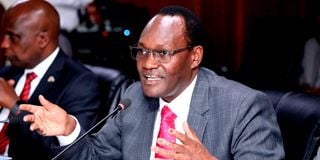Treasury to table Cabinet memo on pending bills

National Treasury Principal Secretary Chris Kiptoo when he appeared before the Public Debt and Privatisation Committee at Parliament Buildings on March 6, 2023.
The National Treasury will next week table a Cabinet memorandum outlining mechanisms to clear the Sh641 billion owed to contractors and suppliers.
Treasury Principal Secretary Chris Kiptoo told the National Assembly’s Budget and Appropriations Committee (BAC) that State enterprises owe suppliers and contractors Sh407 billion, county governments Sh160 billion and ministries, departments and agencies Sh18.3 billion.
He said Cabinet is expected to approve the formation of an inter-ministerial team to review the huge outstanding bills and come up with a budget to clear them by September.
The team will comprise officials from the Ministry of Finance, Office of the Auditor General, Ministry of Roads, Public Works and Housing, Public Procurement Regulatory Authority and Ethics and Anti-Corruption Commission.
It will also include members from the Law Society of Kenya, the Institution of Engineers of Kenya and the Institute of Certified Public Accountants of Kenya.
“The Cabinet memorandum will be presented to Cabinet next week. By September, we must have done a review of all pending bills and come up with a budget that will clear all outstanding payments to suppliers and contractors,” said Dr Kiptoo.
He appeared before BAC, chaired by Kiharu MP Ndindi Nyoro, to respond to questions that arose during the scrutiny of the 2023/24 budget estimates. Mr Nyoro noted that several ministries, counties and State enterprises have huge outstanding bills.
“Pending bills increase when the constitution and the Public Finance Management Act require that pending bills be the first charge on the budget of the government entity concerned in the subsequent financial year,” said Mr Nyoro.
Dr Kiptoo said Treasury would formulate a supplementary budget to clear all outstanding bills that are deemed payable.
“After we clear all the outstanding bills, the pending bills that will arise in the 2023/24 financial year will be the first burden after June next year. As National Treasury, we will be very strict with those entities that fail to clear pending bills in the financial year in which they arise,” Dr Kiptoo said.
Accused predecessor
President William Ruto last month accused his predecessor’s administration, in which he was the Deputy President, of hiding more than Sh200 billion in pending bills.
“When we came to office, we found that they had not accounted for about Sh130 billion in outstanding bills and almost Sh90 billion that was supposed to be given to counties,” Dr Ruto said.
At least 160 government entities have accumulated Sh408 billion in outstanding bills, of which Sh166.99 billion was unpaid dues to contractors and Sh115.7 billion was owed to suppliers as of December last year.
In February, Parliament launched investigations into allegations of diversion of payments meant for suppliers, which was blamed for the growing outstanding bills.
Controller of Budget (CoB) Margaret Nyakang’o told the Public Investments and Special Funds committee that the diversion of payments to other suppliers not on the payment schedules had worsened the pending bills headache.
“Some of the major reasons for the huge outstanding bills is the diversion of payments from the rightful payees to others who are not on the list that I authorise for payments,” Dr Nyakang’o said.
She further told the committee that individuals who make payments to suppliers of goods and services at both levels of government and parastatals have in some instances removed transactions they feel are not in their interest and left them as outstanding bills.
She added that the lack of automation had made it impossible for her office to have a full view of transactions once it approves withdrawals.
Dr Nyakang’o’s office does not have real-time access to county accounts, a loophole that the devolved units continue to use to make discriminatory payments to contractors, in addition to submitting fictitious claims.




